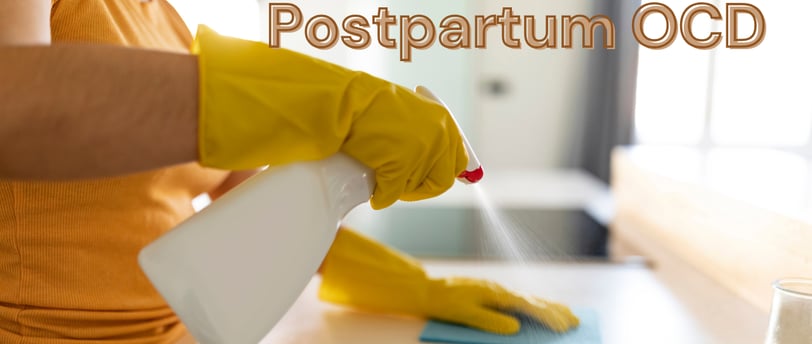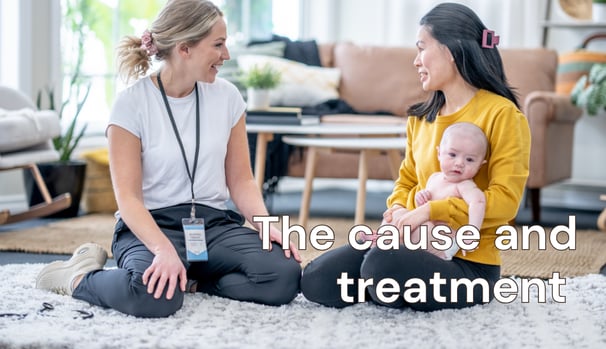OCD and Intrusive Thoughts in the Postpartum Period
7/1/20254 min read


Becoming a parent is one of life’s most transformative—and overwhelming—experiences. It invites love, vulnerability, and a deep desire to protect. But for some new mothers and fathers, that protective instinct is accompanied by something terrifying: intrusive thoughts.
These thoughts may be violent, disturbing, or completely out of character. They might involve images of accidentally (or even intentionally) harming the baby, irrational fears about contamination, or obsessive doubts about being a “safe” parent. They feel horrifying, shameful, and deeply isolating.
This experience is not uncommon. In fact, a significant number of new parents experience intrusive thoughts during the postpartum period—especially those with or at risk for postpartum obsessive-compulsive disorder (OCD). And while these thoughts can be deeply distressing, they do not mean a parent is dangerous, unstable, or unfit.
At Peace Temple, we’ve supported countless mothers and fathers through this exact struggle. Our message is simple: You are not your thoughts. You are not alone. And you can get better.
What Is Postpartum OCD?
Postpartum OCD is a perinatal mood and anxiety disorder characterized by:
Obsessions: Persistent, unwanted thoughts or fears that are disturbing and hard to control.
Compulsions: Repetitive behaviours or mental acts performed to neutralize or prevent the feared outcome.
It differs from postpartum depression or general anxiety in that the focus is often on preventing imagined harm, typically to the baby. The parent becomes trapped in a loop of fear, hypervigilance, and mental exhaustion.
Common Obsessions:
Fear of harming the baby by accident (dropping, smothering, shaking)
Fear of purposely harming the baby (even without any desire or intent)
Fear of contamination or germs
Fear of being an inadequate or dangerous parent
Common Compulsions:
Excessive checking (e.g., if the baby is breathing)
Avoidance (e.g., refusing to hold or bathe the baby)
Repetitive cleaning or handwashing
Seeking reassurance constantly
These symptoms are not “quirky” or “new parent nerves”—they are debilitating, frightening, and very real.
The Role of Intrusive Thoughts
Intrusive thoughts are at the core of postpartum OCD—and they can be horrifying. Parents often report:
Visualizing themselves doing something harmful to their baby
Hearing a mental voice urging them to act destructively
Worrying they’ll lose control and become someone they’re not
These thoughts cause immediate panic, guilt, and shame. But here’s the most important thing to understand: having an intrusive thought is not the same as wanting to act on it.
In fact, people with postpartum OCD are often the least likely to ever act on these thoughts—because they are so disturbed by them. The thoughts are ego-dystonic (completely out of alignment with personal values), which is one of the hallmarks of OCD.
At Peace Temple, we help clients understand this critical distinction: Intrusive thoughts are symptoms—not signs of danger.
Why Does Postpartum OCD Happen?
Several biological and psychological factors can increase susceptibility to OCD in the postpartum period:
1. Hormonal Shifts
The drop in Estrogen and progesterone after birth can affect neurotransmitter levels, including serotonin and dopamine—both of which influence mood and thought regulation.
2. Sleep Deprivation
Chronic lack of sleep can exacerbate obsessive thinking, increase emotional reactivity, and impair the brain’s ability to filter out irrational fears.
3. Previous Mental Health History
Individuals with a history of anxiety, OCD, or trauma are more likely to develop postpartum OCD—especially if they had OCD symptoms before pregnancy.
4. Personality Traits
High levels of responsibility, perfectionism, or a strong need for control can make someone more vulnerable. These traits, while often adaptive in life, can become intensified in the context of new parenthood.
At Peace Temple, we tailor support to each individual’s story—understanding how personality, past experiences, and brain chemistry intersect.


Why Parents Don’t Speak Up
One of the most dangerous aspects of postpartum OCD is that it thrives in silence. Many parents are terrified of telling anyone about their intrusive thoughts, fearing:
Being judged as unfit
Having their child taken away
Being diagnosed with psychosis
But OCD is not psychosis. Parents with postpartum OCD are aware that their thoughts are irrational. They don’t lose touch with reality—they fear it.
Unfortunately, because OCD isn’t widely discussed in the context of parenthood, many people suffer alone. At Peace Temple, we make it a priority to educate not just mothers, but partners and families—so that help-seeking becomes an act of strength, not shame.
What Treatment Looks Like
Postpartum OCD is highly treatable—with the right support and approach.
1. Cognitive Behavioural Therapy (CBT)
Specifically, Exposure and Response Prevention (ERP) is the gold standard for OCD. This technique helps clients gradually face their fears without performing the compulsions that reinforce them.
At Peace Temple, ERP is delivered in a trauma-informed, compassionate way that respects the unique sensitivities of new parents.
2. Medication
SSRIs like sertraline or fluoxetine are commonly prescribed and often safe for breastfeeding. Medication helps regulate the brain's serotonin pathways, reducing both obsessions and compulsions.
3. Mindfulness and Acceptance-Based Approaches
Rather than trying to suppress or “fix” thoughts, mindfulness helps parents observe their mental activity without judgment. This reduces the power of the thoughts and lowers emotional reactivity.
4. Support Groups and Peer Validation
Connecting with others who’ve had similar thoughts is profoundly healing. Knowing you’re not alone—and not “crazy”—can dramatically lower distress.
Peace Temple’s group sessions offer a safe, stigma-free environment for these conversations to happen.
What Recovery Feels Like
Recovery doesn’t always mean the thoughts disappear overnight. It often means:
The thoughts show up less frequently
When they do appear, they feel less intense
Compulsions become less necessary
Confidence in parenting grows
Fear turns into trust—first in others, then in yourself
Healing is possible. Connection is possible. Peace is possible.
Final Thoughts: You Are Not Your Thoughts
The postpartum period is filled with contradictions: joy and fear, love and overwhelm, strength and vulnerability. For those struggling with OCD and intrusive thoughts, it can feel like your own mind has turned against you.
But it hasn’t.
These thoughts are not who you are—they are symptoms of a treatable condition. And no matter how terrifying they feel, they do not make you a danger or a failure.
At Peace Temple, we see the truth behind the fear. We see mothers and fathers brave enough to speak what they were told to hide. We see healing, growth, and reclaimed peace—even after the darkest thoughts.
You are not alone. And you do not have to fight this in silence.
